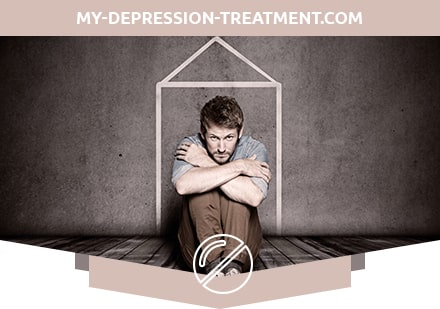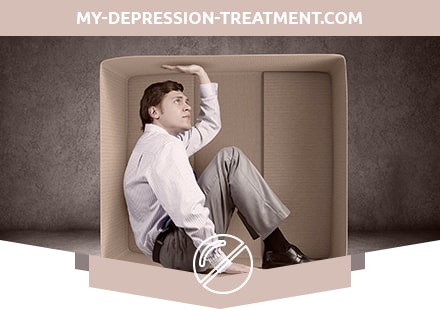
Agoraphobia
Agoraphobia is listed as an anxiety disorder in the Diagnostic and Statistical Manual of Mental Disorder 5 (DSM-5). Agoraphobia is an anxiety disorder that characterized by the fear, uneasiness or horror about leaving familiar surroundings or feel extreme fear to go in open spaces. It is a situation which might cause you to panic and make you feel helpless, scared, embarrassed and trapped. You have fear of an anticipated or actual scenario. You want to avoid using public transportation like bus, car, train, being in open spaces for example parks and fields, standing in a line or in a crowd, being in the enclosed spaces i.e. tunnels, elevators, being outside the home or being in the big places like grocery stores.
People suffering from agoraphobia when finding themselves in a situation of stress, have symptoms of a rapid heartbeat, panic attacks, and nausea. They can also experience these signs and symptoms before they even enter in the situation they are afraid of. In some situations, when this condition becomes worse, people avoid doing their daily routine activities like going to a grocery store to buy the daily routine stuff or going to a bank to pay the bills. They prefer to stay at home most of the time. It is a condition related to anxiety, panic, depression and other phobias.

Meaning of the term «agoraphobia»
The word agoraphobia is derived from the Greek word ‘agora’ that means ‘market place’ and the meaning of ‘phobia’ is ‘fear of’. At the initial stage, it was considered to be a fear or scared of being in a public place or the market place. However, the scared or fear of leaving home is considered not actually with the fear of the public or open place in itself, nor the persons or individuals, but in fact, this fear can result from a past experience or happening of a panic attack in such a place.
Symptoms
People with agoraphobia feel stressed and anxious when they even think about or are in the situation where they think will not get the immediate help and getting out from that location may be embarrassing and difficult for them. They feel danger and threat to their safety and security. The physical symptoms that trigger with agoraphobia are given below:
- Rapid heart rate, palpitation or pounding heart
- Trouble or heavy breathing
- Fear of dying
- Excessive sweating
- Chest pain, high blood pressure or discomfort
- Diarrhea or upset stomach
- Loss of self-control or going crazy
- Dizziness, lightheadedness, unsteady or faint
- Feeling numbness, tingling or shaky
- Sudden chills or flushing
- Feeling of choking
- Derealisation (feeling unreal) or depersonalization (feeling detached from yourself)
- Blurred vision, buzzing in the ears and a dry mouth
- The weakness of the legs
- Muscle pains or headache
- Severe back pain without a reason or apparent cause
Causes of agoraphobia
Most of the cases having agoraphobia showed that it is developed as a complication of panic disorder. Agoraphobia in some cases can be developed if a person already had a panic attack in a certain situation or environment. They start to worry about having another such panic attack too much that they feel the symptoms of panic attack again returning when they go in a similar environment or in a similar condition. This becomes a reason for the person to avoid that particular environment or situation.
Panic disorder
Like other mental health disorders, the exact reason for this panic disorder is still not completely understood. However, most of the researchers and experts believe that it is a combination of biological and physical factors.
Biological factors
There is a number of theories and studies about the kind of biological factors that may be contributed to panic disorders. These biological factors are discussed under:
- Fight or flight’ reflex
One study says that agoraphobia a panic disorder is closely related to the body’s natural ‘fight or flight’ reflex. It is a way to protect and secure you from dangerous and stressful situations. Anxiety causes your body to release the hormones for example adrenaline, and your heart and breathing rate increased. This is a natural way of your body to prepare itself for a dangerous situation. In persons with agoraphobia, it believed that the fight or flight reflex may be triggered in a wrong way and that results in a panic attack.
- Neurotransmitter
The imbalance in the levels of the neurotransmitter in the brain can affect the behaviour and mood. This can also become a reason to lead to an increase in the response of the stress in specific situations and triggering panic feelings.
- The fear network
The theory of the fear network suggests that the people’s brain with panic disorder or agoraphobia may be wired differently from the other persons. There can be a malfunction in brain parts known to produce both the emotions or feelings of fear and the corresponding physical effect fear can bring. They may produce a strong fear of emotions that trigger a panic attack.
Psychological factors
The psychological factors that may increase the risk of developing agoraphobia in you can be:
- A traumatic experience in childhood, for instance, being sexually abused or harassed, or the death of the parents
- Experiencing a stressful or depressing event, for example, being jobless, divorce
- A history of mental illness in the past like anorexia, depression, bulimia or Nervosa
- Being in an unhappy or abusive relationship
- Drug addicted
Agoraphobia without panic disorder
It is also a possibility that it develops in a person without having a history of panic attacks or panic disorder. This kind of agoraphobia can be triggered by numerous irrational fears like the fear that you will be caught a virus of serious illness if you will go at a place with a huge crowd or a fear of being a victim of a terrorist attack or a gunshot incident if you will go out from your house. Some people also have a fear that an accident will happen and that will result in their humiliation and embarrassment in front of others.
Diagnosis
A doctor will ask the person with suspected agoraphobia about his or her signs and symptoms, places and times when he or she felt anxiety and fear. How often the signs occur, and what is the duration of these feelings of fear?
Physical examination and blood tests
The doctor will do a physical examination and may run some lab blood tests to rule out the other reasons for these signs. For instance hyperthyroidism, an overactive thyroid gland can also sometimes cause the signs that are similar to the symptoms of agoraphobia. After carrying out these results the doctor will be able to do the correct diagnosis and will refer the person to a psychiatrist if he will feel its need.
Confirm the diagnosis
To diagnose the agoraphobia, the psychiatrist will ask some questions from the person about the symptoms in detail. To have a diagnosis of this anxiety situation an individual must feel severe panic or fear in at least two of the given situations:
- Going outside of the home alone
- Using any mode of public transportations such as bus, taxi, train or plane
- Standing and waiting in a line or being in a gathering or crowd
- Being in an enclosed place, for example, a meeting room or a movie theatre
- Being in an open place like a mall, garden, bridge or parking lot
Treatment
The treatment of agoraphobia is very important as it helps you to get better and to overcome your fear. Its treatment normally includes medication and psychotherapy.
Medication
To treat agoraphobia, certain kinds of antidepressants are mostly used and in some cases, anti-anxiety medicines are also used for a limited time. Antidepressants are more useful and effective than the medications of anti-anxiety in the agoraphobia treatment.
- Antidepressants
Specific antidepressants known as selective serotonin reuptake inhibitors (SSRIs) for instance sertraline (Zoloft), fluoxetine (Prozac) are used for the cure of depression and agoraphobia. These medicines have some side effects too but, these drugs are playing an important role in the cure of the agoraphobia. You can take other antidepressant medicines as well as these drugs are also used for the effective treatment of this panic disorder.
- Anti-anxiety medicines
Anti-anxiety medicine known as benzodiazepines is actually a sedative. You doctor will recommend this medicine for a limited time just for the temporary relive in some circumstances. Most of the times, this drug is given in severe anxiety or panic attacks. In other cases, these drugs are not a good choice.
The drugs can take weeks to provide you relieve and you may have to try various different drugs before you find out the best for you in terms of results.
Cognitive behaviour therapy (CBT)
The therapist helps the patient through this therapy, to recognize and understand the thoughts that become a reason for anxiety and teach him or her how to react differently to those panic thoughts. The therapist will also help the patient in dealing with stress management and to reduce the anxiety and fear, the techniques of the relaxation. During the therapy sessions, the therapist will ask the patient to think about the stressful situations and work through the feelings and emotions related to them. In the advanced stage of the therapy, the therapist will guide the person through real-life events or situations that can become a reason for anxiety and help the patient to control and overcome these emotions.
CBT normally needs 12 to 20 weeks for the treatment when it is combined with the medication. Without the drugs, the duration of the CBT prolongs and needs to continue for around a year or most depending on the condition of the patient.

Actions to overcome agoraphobia besides the treatment
A person having agoraphobia needs to do a few things to control his fear on its own and to perform his normal routine tasks in an effective way. These actions are discussed below
- Educate yourself
One of the challenge and problem a person faced to overcome his agoraphobia condition is lack of information and knowledge about this. They need to learn to correct their irrational thoughts of a certain place or a specific environment being unsecured and without an easy escape. They need to learn how they can respond in the anticipatory anxiety situation of entering in the close and open places. It will help them to manage their fear, insecurity and anxiety.
- Find support
As millions of people have a specific phobia, thus, it is very important to take out some time and check out what your phobia is and which kind of support is available to you in your surroundings or in your community. Nowadays there are various online support groups are also offer you their services and can play an important role in changing your lives, to control your anxiety level while going out from your home and to go in the open places. You can also take the help of a person. Do not feel embarrassed or shy to tell your family and friends about your condition and take their help in overcoming your phobia.
- Psychiatrist
If you cannot feel comfortable in sharing your phobia with your family and friends do not hesitate and do not give it even a single thought to discuss this with your psychiatrist or the doctor. Maybe a present stage you find it controllable and manageable but if you will give attention to this situation it will become worse and over the time the anxiety and fear will be increased and will stick you in your home.
- Avoid alcohol and recreational drugs
Try your best to avoid any kind of drug especially alcohol and caffeine. These drugs can worsen your anxiety symptoms or panic attacks.
Bottom Line
Agoraphobia is an anxiety disorder and less than 2 percent of the population is suffering from the disorder. Through proper treatment, a patient can overcome this disease. It is very important to talk about this disease. If someone is suffering through this, he should not feel embarrassed to talk about this. Must talk about it with your family or friends and if you need do not feel shy to consult with a doctor or mental health professional.
 DE
DE FR
FR IT
IT ES
ES



